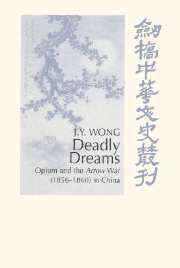Book contents
- Frontmatter
- Contents
- List of Tables
- List of Figures
- Poem by the late Mr Qin Esheng
- Foreword by Professor Wang Gungwu
- Foreword by Professor C. A. Bayly
- Preface
- Part I The confusion of imperialism
- Part II The pretext for imperialism
- Part III The personalities of imperialism
- Part IV The rhetoric of imperialism
- Part V The mechanics of imperialism
- 11 Behind the scenes: The diplomacy of imperialism
- 12 Behind the scenes: The politics of imperialism
- 13 In the wings: The lobbies of imperialism
- Part VI The economics of imperialism
- Part VII The dynamics of imperialism
- Chronology of major events
- Word list
- Abbreviations
- Bibliography
- Index
11 - Behind the scenes: The diplomacy of imperialism
Published online by Cambridge University Press: 29 September 2009
- Frontmatter
- Contents
- List of Tables
- List of Figures
- Poem by the late Mr Qin Esheng
- Foreword by Professor Wang Gungwu
- Foreword by Professor C. A. Bayly
- Preface
- Part I The confusion of imperialism
- Part II The pretext for imperialism
- Part III The personalities of imperialism
- Part IV The rhetoric of imperialism
- Part V The mechanics of imperialism
- 11 Behind the scenes: The diplomacy of imperialism
- 12 Behind the scenes: The politics of imperialism
- 13 In the wings: The lobbies of imperialism
- Part VI The economics of imperialism
- Part VII The dynamics of imperialism
- Chronology of major events
- Word list
- Abbreviations
- Bibliography
- Index
Summary
I. Business as usual
Palmerston's cabinet learnt about the Arrow quarrel much earlier than the British public, by almost a month. On 1 December 1856, the Foreign Office received bundles of Borwing's despatches, with enclosures. Analysed hereunder are those despatches related to the affairs at Canton.
The first was dated 13 October 1856, with seventeen enclosures, all of which were about the Arrow incident and its immediate aftermath. Lord Clarendon got round to reading these documents four clays after their arrival, on 5 December. He minuted: ‘Ask the lord advocate if the treaty had been infracted’. The document was referred to the lord advocate the next day.
The second was dated 14 October, in which Bowring forwarded Parkes's despatch on the rebellions in South China, and on which Clarendon simply pencilled ‘C’. As mentioned before, Parkes's intention in writing this sort of despatch, which was a mere regurgitation of stale news, seems to have been to assure Bowring that he might safely use coercive measures against China. By forwarding the same despatch to London, Bowring was giving Whitehall the same message.
In the third, dated 15 October 1856, Bowring reported that Yeh had refused to redress the alleged insult to the British flag. Clarendon again referred it to the lord advocate. This was done on 6 December.
From none of these Whitehall proceedings may we hear any battle cries, or smell any gunpowder, notwithstanding Parkes's blatant suggestion that force might safely be used against China.
- Type
- Chapter
- Information
- Deadly DreamsOpium and the Arrow War (1856–1860) in China, pp. 261 - 282Publisher: Cambridge University PressPrint publication year: 1998



